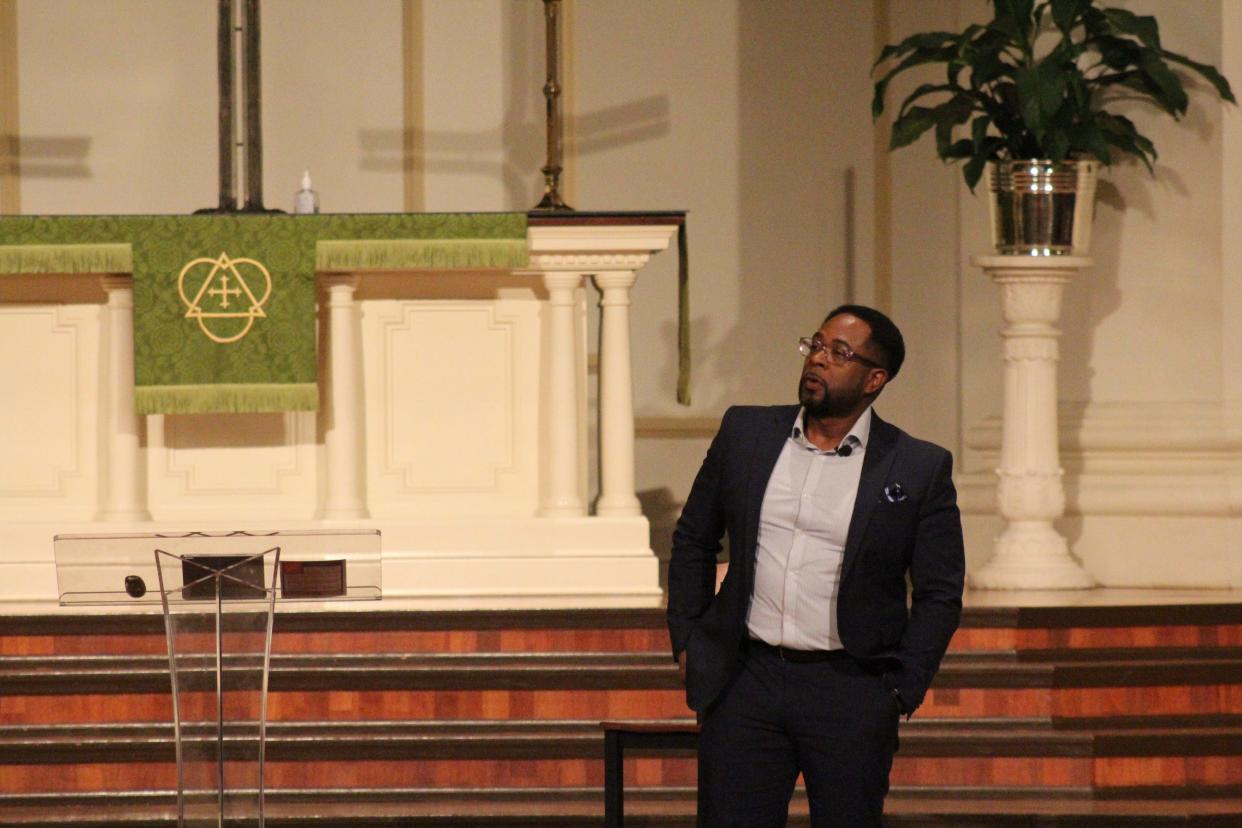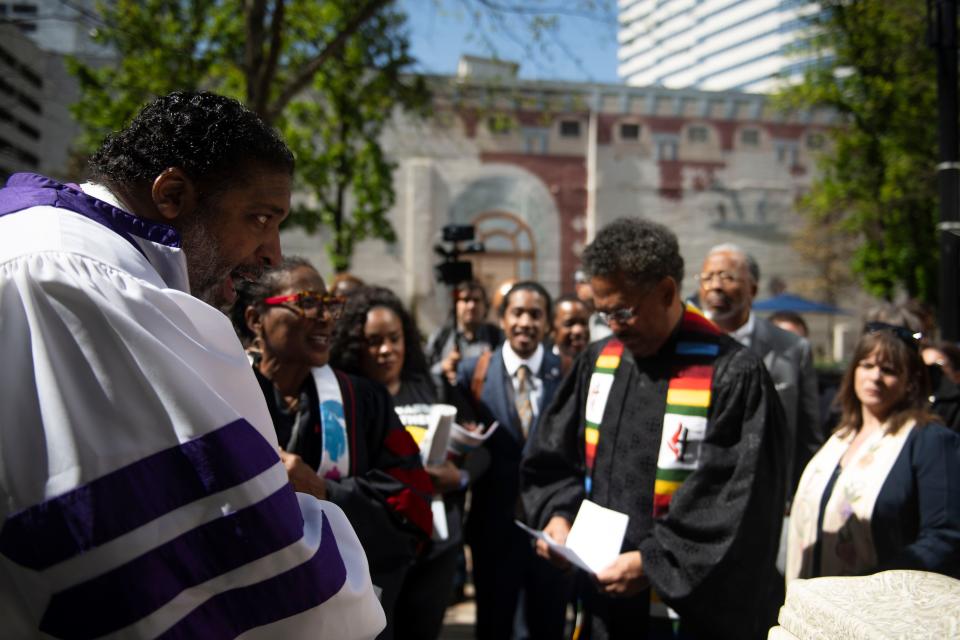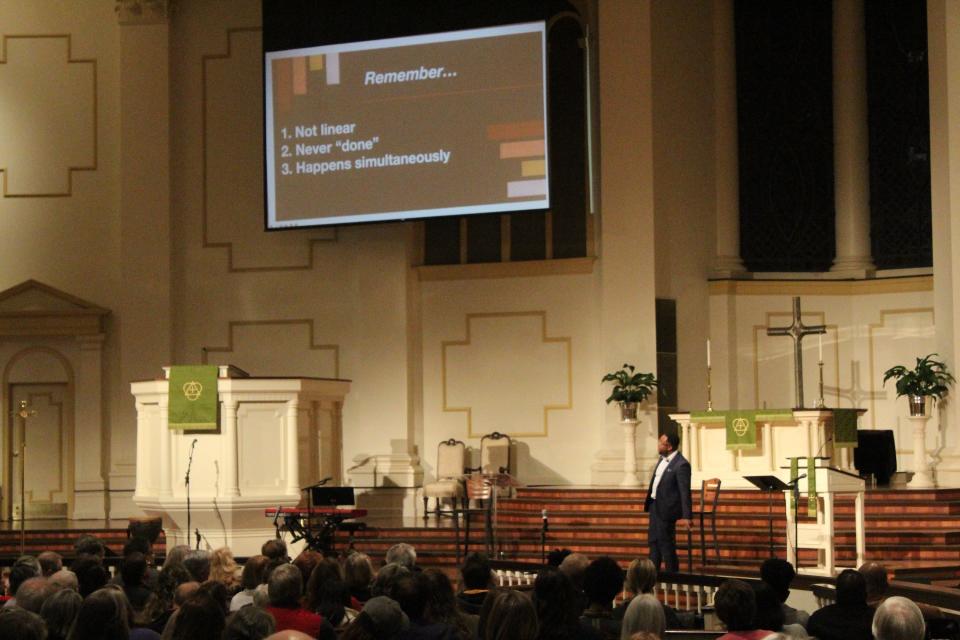Prominent Williamson County church tackles ways to combat racism at Jemar Tisby keynote

Editor’s note: This story has been updated to correct some references to Brentwood United Methodist Church.
Churches are a key barrier between white communities and communities of color, said religious historian Jemar Tisby to an audience of hundreds seated in the sanctuary of a prominent suburban church in a majority white, upper-middle class area.
“White folks, y’all got to build bridges instead of barriers,” Tisby said in a keynote address at Brentwood United Methodist Church on Tuesday night. “And you got a lot of experience with barrier building: neighborhoods, schools, churches.”
Tisby, a professor at Simmons College in Louisville and a well-known speaker and author, addressed Brentwood UMC to kick off a series of events at the church organized by its race and faith team. Tisby’s message was broadly resonant — he largely summarized ideas in his 2021 book, “How to Fight Racism: Courageous Christianity and the Journey Toward Racial Justice” — but it was also especially relevant for a church in Williamson County.
Race has been central to fierce debate in Williamson County over Williamson County Schools curriculum and municipal politics, a recent example being Gabrielle Hanson’s controversial bid for Franklin mayor. Hanson, who previously came under fire for remarks about a local Juneteenth event, received support on the campaign trail from members of a local white supremacist group.
It’s this sort of heightened antagonism toward efforts to raise awareness about racism from which the Brentwood UMC race and faith team emerged in response to and has sought to combat through events like Tisby’s keynote address. For Tuesday’s event, the race and faith team collaborated with Belmont University and the UMC Tennessee Western Kentucky Conference anti-racism coalition, resulting in a racially diverse audience comprised of residents from both the surrounding suburbs and from Nashville.
Nashville pastor Rev. Stephen Handy, who leads McKendree UMC, spoke at Tuesday's event following Tisby's address. Leading the audience in an exercise to illustrate the importance of dialogue, Handy picked audience members out of the crowd and invited them to stand up front. With each new person he added to the group, Handy said, “What does this conversation look like?”

The seven total audience members Handy selected were of different ages, and racial and ethnic identities. “Imagine these people got together once a week over a cup of coffee,” Handy said.
Handy and Tisby both said the method to bridging racial divides — building relationships and engaging new people in conversation — is straightforward. But the challenge is often someone’s willingness.
“We don’t have a ‘how to’ problem, we have a ‘want to’ problem,” Tisby said in his address “It’s the will, the desire, the conviction, and the courage to fight racism.”
In addition to its series for Black History Month, the Brentwood UMC race and faith team plans other events year around and it also facilitated formal partnerships between Brentwood UMC and two historically Black congregations, Seay-Hubbard UMC and Dickson Memorial UMC. Those partnerships have led to joint worship events and a 2020 forum.

Initiatives similar to that of Brentwood UMC in Williamson County specifically include the Franklin Justice and Equality Coalition, which has brought together Black and white pastors from different denominations in the area, Better Together, which is a partnership between Brentwood Baptist Church and Mt. Zion Missionary Baptist Church, and Church of the City’s advisory council on racial reconciliation. The Franklin nonprofit Empty Hands Fellowship previously organized events promoting similar dialogue.
Not everyone will be receptive to that kind of outreach, Tisby said Tuesday night in response to an audience question about dealing with naysayers who dismiss efforts to raise awareness about social issues as “woke.” In those scenarios, Tisby advised people to still try their best and then leave it be.
“We really do think we’re the saviors of people,” Tisby said. “But our work is to speak the truth in love and let God do the rest.”
Other recent event featuring Tisby: Amid film backlash, evangelical leaders double down on denouncing Christian nationalism
Liam Adams covers religion for The Tennessean. Reach him at ladams@tennessean.com or on social media @liamsadams.
This article originally appeared on Nashville Tennessean: Brentwood UMC wrestles with combating racism at Jemar Tisby keynote

